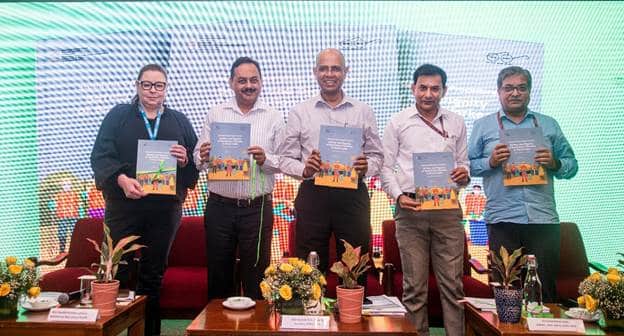DDWS and UNICEF Host National Rural Sanitation Workshop

The National Rural Sanitation Workshop, organized by the Department of Drinking Water and Sanitation (DDWS) under the Ministry of Jal Shakti and UNICEF India, took place today at the India Habitat Centre in New Delhi. This significant event gathered senior government officials, state mission directors, development partners, and sector experts to assess the progress of the Swachh Bharat Mission-Gramin (SBM-G) and to outline priorities for its upcoming phase. The workshop emphasized the importance of sanitation as a matter of dignity and sustainability, while also addressing the need for climate resilience in sanitation services.
Key Insights from the Workshop
The workshop commenced with remarks from Karina Malczweska, Chief WASH & CCES at UNICEF, who highlighted the necessity of evolving from merely safe and inclusive sanitation to a more resilient and future-ready approach. This aligns with broader sustainable rural development goals. Following her, Shri Kamal Kishore Soan, Additional Secretary and Mission Director for JJM & SBM-G, underscored the workshop’s role as a platform for reflection and recalibration. He noted that as climate risks escalate, integrating resilience into sanitation systems is crucial. The government remains committed to providing states with the necessary tools and resources to enhance their sanitation efforts.
During the event, Secretary of DDWS, Shri Ashok KK Meena, delivered a compelling address, stating that sanitation transcends infrastructure; it embodies dignity, equity, and sustainability. He reiterated the government’s commitment to ensuring that no one is left behind and emphasized the importance of local leadership in the next phase of SBM-G.
New Protocols for Sanitation Services
A significant highlight of the workshop was the release of two essential technical publications aimed at enhancing sanitation services in rural India. The first publication is the “Standard Operating Procedures for the Safety and Dignity of Sanitation Workers in Rural India,” which aims to ensure the protection and respect of those working in sanitation. The second is the “Protocol for Developing Climate Resilient Sanitation Technical Designs and Services,” which focuses on creating sanitation systems that can withstand climate challenges.
These publications represent a critical step towards making sanitation services not only safe and inclusive but also equitable and resilient to climate change. The workshop’s discussions reinforced the need for a comprehensive approach to sanitation that incorporates local governance and community involvement.
Strengthening Local Governance
Shri Sushil Kumar Lohani, Additional Secretary at the Ministry of Panchayati Raj, led a session on enhancing the role of Panchayati Raj Institutions in sustaining sanitation outcomes. He emphasized the vital role of Gram Panchayats (GPs) in achieving sanitation goals. With over 250,000 Panchayats utilizing the e-GramSwaraj platform to prepare thematic development plans, local governance is becoming increasingly central to rural sanitation efforts.
The session also highlighted the Clean and Green Panchayat initiative, which empowers local bodies to take charge of waste management, grey water reuse, and inclusive sanitation infrastructure. This initiative aims to deliver tangible outcomes that align with the Sustainable Development Goals. Best practices from award-winning Gram Panchayats were shared, showcasing successful efforts in waste segregation, large-scale composting, and eco-friendly sanitation practices.
Progress and Future Directions
The SBM-G review session provided a comprehensive overview of the progress made across various states and union territories. Notable achievements include that 80% of targeted villages have attained ODF Plus Model status, although only 54% have been verified. Additionally, grey water management coverage has reached 91% nationally, with over 20 states and UTs exceeding 95%. Solid waste management coverage stands at 87%, while plastic waste management has achieved 70% block-level coverage, although functionality remains a concern.
As the Swachh Bharat Mission marks its tenth anniversary, the workshop reaffirmed the government’s commitment to advancing the next phase of SBM-G. This phase will focus on integrating local leadership, fostering climate-smart innovations, and promoting sustainability. With a strong emphasis on convergence, monitoring, and behavior change, the mission aims to evolve towards a cleaner, healthier, and more equitable rural India.
Observer Voice is the one stop site for National, International news, Sports, Editor’s Choice, Art/culture contents, Quotes and much more. We also cover historical contents. Historical contents includes World History, Indian History, and what happened today. The website also covers Entertainment across the India and World.
Follow Us on Twitter, Instagram, Facebook, & LinkedIn

